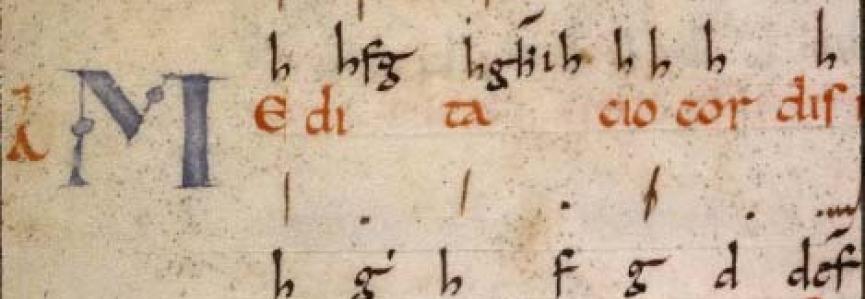
Organisateurs IRHT
Descriptif
Un partenariat se met en place entre l'Université de la Ville de Vienne et la section de musicologie de l'IRHT, avec l'organisation d'un workshop le mercredi 6 décembre 2023 de 14h à 16h "New Insight on Gregorian Chant Tradition", rassemblant trois chercheurs, Olivier Cullin, Jean-Fr. Goudesenne et Susana Zapke. Un événement qui prélude au séminaire sur "l'historiographie du chant grégorien" qui commencera le mardi 9 janvier 2024 à la Bibliothèque Sainte-Geneviève (10h-12h30).
Programme
- What we can read, what we can understand, what we can sing ? – Dr. Olivier Cullin (Université de Tours)
Taking the example of communion Nemo te condemnavit, we will approach the writing/oral relationship and their conflicts. We will question the nature of singing and what we can understand, offering some reflections on the meaning of what a "tradition” is. - « Die nicht temperierte Psalmodie » : Cantus Intonation in the first Millenium : Envisioning new Chant Performances – Dr. Jean-François Goudesenne, IRHT (CNRS-Orléans)
Both musicologist and keyboard player Goudesenne, practising tuning in 16-17th c. instruments asks why Gregorian Chant remains systematicly performed by singers on the « wholtemperierte » scale of the post Schönberg habitus. The example of the Canticum Danielis, Benedictus es in firmamento in the Dijon-Montpellier codex with double neumatic and alphabetic volpiano a-p notation, with the help from an antique 7 chords lyra, will permit us to perform psaltic art by using microtones, mostly inspired by Greek Byzantine chant usages, based on different tetrachords (here the synemenon). Students are invited to experiment pythagorician principles (for the main structures of the scales), combined with mobile (unstable) pitches according to genres (a little bit like Greek Antique system), shaping then rhetoric effects and the ethos concept in the peculiar contexts of liturgy. This approach, formerly considered as « exotic orientalism » imposes itself nowadays as a main esthetic stake of creativity for interprets of Ancient music, as important for the music langage as Rameau for tonal system around 1700.
INFORMATIONS PRATIQUES
Type d'événement: Atelier
Lieu :
Conditions d'accès
Libre
Date des séances
06/12/2023 - 14:00
Université de Vienne
Johannesgasse 4a, Raum 2.04
